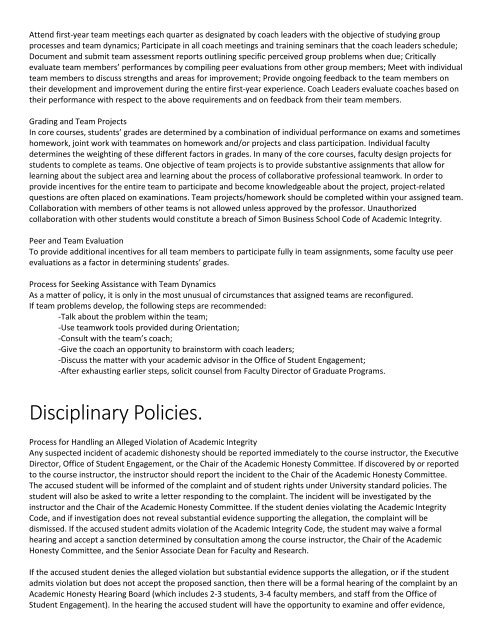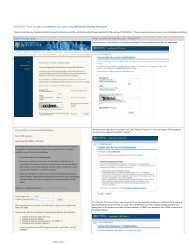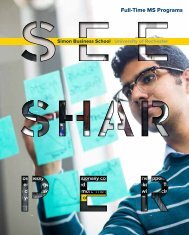mySimon student handbook
Create successful ePaper yourself
Turn your PDF publications into a flip-book with our unique Google optimized e-Paper software.
Attend first-year team meetings each quarter as designated by coach leaders with the objective of studying group<br />
processes and team dynamics; Participate in all coach meetings and training seminars that the coach leaders schedule;<br />
Document and submit team assessment reports outlining specific perceived group problems when due; Critically<br />
evaluate team members’ performances by compiling peer evaluations from other group members; Meet with individual<br />
team members to discuss strengths and areas for improvement; Provide ongoing feedback to the team members on<br />
their development and improvement during the entire first-year experience. Coach Leaders evaluate coaches based on<br />
their performance with respect to the above requirements and on feedback from their team members.<br />
Grading and Team Projects<br />
In core courses, <strong>student</strong>s’ grades are determined by a combination of individual performance on exams and sometimes<br />
homework, joint work with teammates on homework and/or projects and class participation. Individual faculty<br />
determines the weighting of these different factors in grades. In many of the core courses, faculty design projects for<br />
<strong>student</strong>s to complete as teams. One objective of team projects is to provide substantive assignments that allow for<br />
learning about the subject area and learning about the process of collaborative professional teamwork. In order to<br />
provide incentives for the entire team to participate and become knowledgeable about the project, project-related<br />
questions are often placed on examinations. Team projects/homework should be completed within your assigned team.<br />
Collaboration with members of other teams is not allowed unless approved by the professor. Unauthorized<br />
collaboration with other <strong>student</strong>s would constitute a breach of Simon Business School Code of Academic Integrity.<br />
Peer and Team Evaluation<br />
To provide additional incentives for all team members to participate fully in team assignments, some faculty use peer<br />
evaluations as a factor in determining <strong>student</strong>s’ grades.<br />
Process for Seeking Assistance with Team Dynamics<br />
As a matter of policy, it is only in the most unusual of circumstances that assigned teams are reconfigured.<br />
If team problems develop, the following steps are recommended:<br />
-Talk about the problem within the team;<br />
-Use teamwork tools provided during Orientation;<br />
-Consult with the team’s coach;<br />
-Give the coach an opportunity to brainstorm with coach leaders;<br />
-Discuss the matter with your academic advisor in the Office of Student Engagement;<br />
-After exhausting earlier steps, solicit counsel from Faculty Director of Graduate Programs.<br />
Disciplinary Policies.<br />
Process for Handling an Alleged Violation of Academic Integrity<br />
Any suspected incident of academic dishonesty should be reported immediately to the course instructor, the Executive<br />
Director, Office of Student Engagement, or the Chair of the Academic Honesty Committee. If discovered by or reported<br />
to the course instructor, the instructor should report the incident to the Chair of the Academic Honesty Committee.<br />
The accused <strong>student</strong> will be informed of the complaint and of <strong>student</strong> rights under University standard policies. The<br />
<strong>student</strong> will also be asked to write a letter responding to the complaint. The incident will be investigated by the<br />
instructor and the Chair of the Academic Honesty Committee. If the <strong>student</strong> denies violating the Academic Integrity<br />
Code, and if investigation does not reveal substantial evidence supporting the allegation, the complaint will be<br />
dismissed. If the accused <strong>student</strong> admits violation of the Academic Integrity Code, the <strong>student</strong> may waive a formal<br />
hearing and accept a sanction determined by consultation among the course instructor, the Chair of the Academic<br />
Honesty Committee, and the Senior Associate Dean for Faculty and Research.<br />
If the accused <strong>student</strong> denies the alleged violation but substantial evidence supports the allegation, or if the <strong>student</strong><br />
admits violation but does not accept the proposed sanction, then there will be a formal hearing of the complaint by an<br />
Academic Honesty Hearing Board (which includes 2-3 <strong>student</strong>s, 3-4 faculty members, and staff from the Office of<br />
Student Engagement). In the hearing the accused <strong>student</strong> will have the opportunity to examine and offer evidence,




